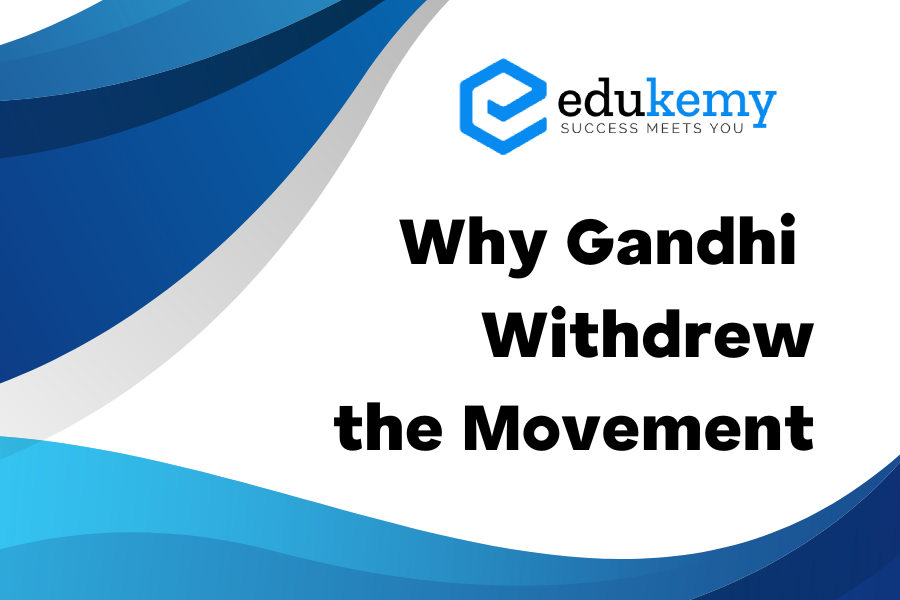
Gandhi’s decision to withdraw from the movement was a pivotal moment in India’s struggle for independence, marked by both strategic foresight and moral conviction. As the leader of the Indian National Congress and the architect of nonviolent resistance, Gandhi possessed a unique understanding of the political and social dynamics at play. His withdrawal from the movement, notably during critical junctures such as the Non-Cooperation Movement of 1922 and the Quit India Movement of 1942, stemmed from a deeply principled approach aimed at preventing violence, preserving unity, and upholding the ethical underpinnings of the struggle. By examining Gandhi’s rationale for withdrawal, one gains insight into his complex philosophy of nonviolence, his commitment to inclusivity, and his unwavering belief in the transformative power of peaceful resistance.
Gandhi decided to withdraw from the Non-Cooperation Movement for several reasons:
Contents
- 1 FAQs
- 1.1 Q: Why did Gandhi withdraw the movement against the British?
- 1.2 Q: Was there pressure from the British authorities that led to Gandhi’s withdrawal of the movement?
- 1.3 Q: Did Gandhi’s decision to withdraw the movement weaken the fight for independence?
- 1.4 Q: How did the Indian populace react to Gandhi’s withdrawal of the movement?
- 2 In case you still have your doubts, contact us on 9811333901.
Fear of Violence:
- Gandhi believed that the movement had not fully imbibed the principles of nonviolence.
- The Chauri-Chaura incident, in which a police station was set on fire and its occupants were killed, deeply troubled Gandhi.
- He felt that such incidents could lead to a violent turn in the movement, which would play into the hands of the colonial authorities.
- Gandhi believed that a violent movement would be easily suppressed by the British, who could use it as a pretext to use their armed forces against the protestors.
Signs of Wear and Tear:
- The Non-Cooperation Movement had been sustained at a high pitch for a considerable period of time, and signs of fatigue were starting to show.
- Sustaining such a mass movement requires immense energy, resources, and discipline, and Gandhi observed that the movement was losing steam.
- The government showed little interest in negotiating or addressing the demands, making it difficult to maintain momentum.
Changing Relevance of Khilafat Issue:
- The Khilafat issue, which had served as a unifying factor during the early stages of the movement, began to lose its relevance.
- In Turkey, the people had risen up under the leadership of Mustafa Kemal Atatürk, and the Sultan’s political power was overthrown.
- Turkey underwent significant modernization, establishing a secular state, introducing a European-style legal system, granting extensive rights to women, nationalizing education, and promoting agriculture and industry.
- As a result, the Khilafat issue lost its significance, as the caliphate was abolished in 1924.
Considering these factors, Gandhi decided to withdraw from the Non-Cooperation Movement, as he believed it was crucial to maintain the principles of nonviolence and avoid a violent outcome.
He also recognized the need to reassess the movement’s objectives and strategies in light of changing circumstances.
FAQs
Q: Why did Gandhi withdraw the movement against the British?
A: Gandhi withdrew the movement as a strategic decision to prevent violence and maintain the principles of nonviolence. He believed that the potential for bloodshed, especially after the Chauri Chaura incident where protesters turned violent, contradicted the core values of the movement.
A: While the British authorities certainly exerted pressure through arrests and crackdowns, Gandhi’s decision to withdraw the movement was primarily driven by his own moral and strategic considerations. He believed that continuing the agitation in the face of escalating violence would undermine the moral high ground of the Indian independence struggle.
Q: Did Gandhi’s decision to withdraw the movement weaken the fight for independence?
A: Gandhi’s decision to withdraw the movement temporarily might have appeared as a setback, but it actually showcased the strength of nonviolent resistance as a strategic tool. It allowed for regrouping, reassessment, and further strategizing, ultimately contributing to the long-term success of the Indian independence movement.
Q: How did the Indian populace react to Gandhi’s withdrawal of the movement?
A: The reaction among Indians was mixed. While some questioned Gandhi’s decision, others respected his commitment to nonviolence and saw the withdrawal as a necessary step to prevent further bloodshed and maintain the moral integrity of the movement. Nevertheless, it sparked debates and discussions across the country about the most effective strategies for achieving independence.
In case you still have your doubts, contact us on 9811333901.
For UPSC Prelims Resources, Click here
For Daily Updates and Study Material:
Join our Telegram Channel – Edukemy for IAS
- 1. Learn through Videos – here
- 2. Be Exam Ready by Practicing Daily MCQs – here
- 3. Daily Newsletter – Get all your Current Affairs Covered – here
- 4. Mains Answer Writing Practice – here

